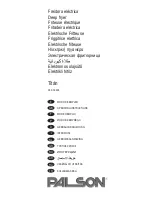
3
GB
Description
The Displa
y
Star
t and
Pr
ogrammes
Laundr
y
W
arnings and
Sug
g
estions
T
ro
u
b
leshooting
S
e
rv
ic
e
Maintenance
and Care
Installation
Permanent venting
In conjunction with the vent tube we recommend
using a Wall/Window Vent Kit, available at a retail
location or the nearest Spare Parts Dealer.
Wall mounting
1. Leave an opening in
the wall to the left of the
dryers proposed position.
2. Keep the tube as short
and straight as possible
to prevent condensed
moisture from backing up
into the dryer.
3. Similarly, the duct in
the wall should slope
downwards towards the
outside.
Window mounting
1. With a stacked dryer
the hole in the window
should ideally be made
below the vent.
2. The tube should be
kept as short as possible.
Depending on how often you use your dryer, it is
essential that areas A and B are checked periodically
to remove lint or debris.
The vent tube adaptor must be fitted securely thus
preventing any humid air from being emitted back into
the room.
!
The Dryer should not be pushed so far back that the
tube adaptor is pulled out of position or the tube is
squashed or bent.
!
The tube should be kept clear of the air intake vent
and kinks or ‘U’ bends must be avoided as these will
obstruct the tube or trap condensation.
Where to put your dryer
●
Place your dryer at a distance from gas ranges,
stoves, heaters, or cook tops because flames can
damage the appliance.
●
If you are going to install the
appliance under a work
counter, be sure to leave a
10mm space between the
top and any other objects on
or above the machine and a
15mm space between the
sides and lateral furnishings
or walls. This is to ensure
proper air circulation. Make sure that the back
vents are not obstructed.
●
Make sure you put your dryer in an environment
that is not damp and has proper air circulation
throughout, the dryer will not operate efficiently in
an enclosed space or cupboard.
!
We do not recommend that the dryer is installed in a
cupboard but the dryer must never be installed
behind a lockable door, a sliding door or a door with a
hinge on the opposite side to that of the dryer door.
Ventilation
The Dryer dries your laundry by drawing in cool, clean
and relatively dry air, heating it, and then distributing it
through the clothes as they are gently tumbled. For
optimum performance, the moist air is then blown out
through a vent tube at the back of the dryer.
When the dryer is in use, there has to be adequate
ventilation to avoid the back flow of gases into the room
from appliances burning other fuels, including open fires.
Mobile venting
A vent tube must always be fitted when the dryer is
used in conjunction with Mobile Venting.
The tube must be fitted securely into the back of the
dryer (
see Dryer Description
). If possible, it is always
best to connect the tube to a permanent
outlet close to the dryer. If permanent installation is
not possible, the dryer will work just as well with the
tube passing through a partly-opened window.
!
Ensure that the end of the tube is not directed
toward the air intake vent at the rear of the dryer.
!
The vent tube should not exceed 2.4 metres in
length and should be kept free of any possible
accumulation of fluff, lint and water by shaking it out
frequently. Always ensure that the tube is not
squashed.
Minimum gap 10mm
Minimum gaps
15mm
Impor
tant
Inf
ormation
Installation
Summary of Contents for TVEL 75C Experience
Page 18: ...18...




































